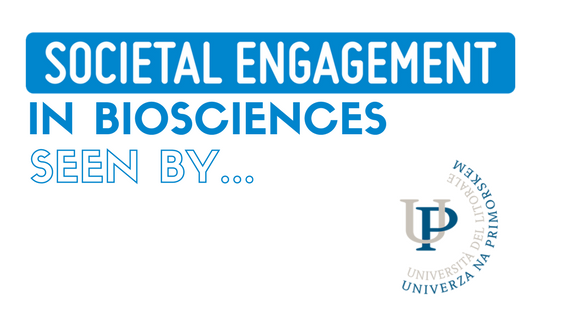
University of Primorska, Department of Biodiversity
Sandra Hasić – research assistant at the Department of Biodiversity of the University of Primorska.
How do you understand Societal Engagement in biosciences research?
Societal engagement for us is not just the involvement of the department’s work in the local environment, but it is one of the most important factors for the long-term influence of our research. Nature conservation can be successful only in collaboration with different stakeholders involved in the processes, such as the local population, representatives of the authorities, NGOs, national institutions, the economy, and policy makers. Therefore, raising awareness regarding biosciences research is an important part of the process. Only with the transfer of knowledge and technologies, as a structural change in field of nature conservation, goal can be achieved.
What are the current standards and actions to achieve better Societal Engagement in your University and in your country?
University of Primorska is a very young University and we are still establishing our position at the local environment, and public engagement is one of the crucial points of gaining recognition in the area. The societal engagement should be focused on future collaborations with different stakeholders in the region and on promotion and integration of biosciences departments. At the national level, we can achieve progress in societal engagement with the establishment of specially designed project scheme for funding the collaborative projects between the University and local stakeholders, the economy and NGOs. Our faculty is very successful in applying for grants in schemes. We believe this is a good starting point for future public engagement activities which will make biosciences more contextualized to local public.
What are you aiming for with the implementation of the STARBIOS2 actions towards better Societal Engagement standards for your institute?
With the planned activities, we aim to improve recognition of our department in local environment, and more importantly, to establish long-term collaboration with different stakeholders. There is an ongoing debate among researchers about intellectual and patent property at UP. We aim to achieve a structural change in the improving technology transfer and regulation of policy regarding the intellectual property.
What kind of actions are you going to establish to fulfill your objectives?
We have already conducted a survey of public interest in biology talks. This survey was used for creating and organizing a cycle of talks under the name “Growing UP in the Universe”. Such talks and events are important for involving general public in our research. We aim to make research in biosciences more contextualized and appealing, by providing media reports of all major events and interacting with interested public also on social media.
Who is involved, from your University, in the Action Plan in order to complete your final objective?
The entire department of Biodiversity is involved in this Action Plan, with majority of actions overseen by the research assistant Sandra Hasić. We collaborate closely with our PR representative Mitja Tretjak and members of Society of Conservation Biology Students BIODIVA. By enrolling in national programmes, we closely collaborate with NGOs, other departments and members of the University, and local economy.
Read our previous article on the Gender in Biosciences by the University of Primorska.







